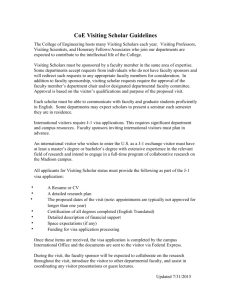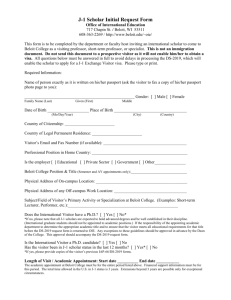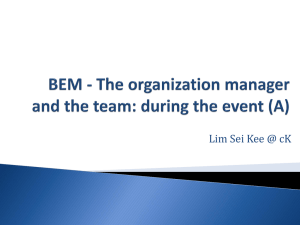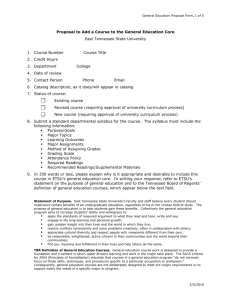A Guide for Departments Hosting Visiting Professors / Scholars
advertisement
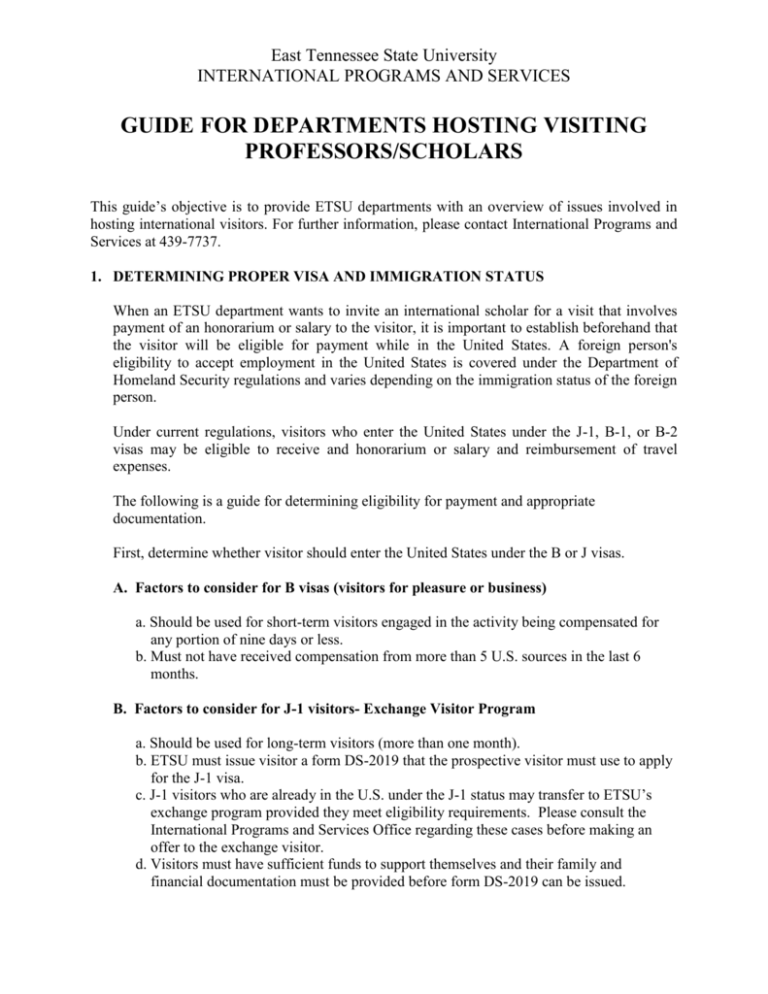
East Tennessee State University INTERNATIONAL PROGRAMS AND SERVICES GUIDE FOR DEPARTMENTS HOSTING VISITING PROFESSORS/SCHOLARS This guide’s objective is to provide ETSU departments with an overview of issues involved in hosting international visitors. For further information, please contact International Programs and Services at 439-7737. 1. DETERMINING PROPER VISA AND IMMIGRATION STATUS When an ETSU department wants to invite an international scholar for a visit that involves payment of an honorarium or salary to the visitor, it is important to establish beforehand that the visitor will be eligible for payment while in the United States. A foreign person's eligibility to accept employment in the United States is covered under the Department of Homeland Security regulations and varies depending on the immigration status of the foreign person. Under current regulations, visitors who enter the United States under the J-1, B-1, or B-2 visas may be eligible to receive and honorarium or salary and reimbursement of travel expenses. The following is a guide for determining eligibility for payment and appropriate documentation. First, determine whether visitor should enter the United States under the B or J visas. A. Factors to consider for B visas (visitors for pleasure or business) a. Should be used for short-term visitors engaged in the activity being compensated for any portion of nine days or less. b. Must not have received compensation from more than 5 U.S. sources in the last 6 months. B. Factors to consider for J-1 visitors- Exchange Visitor Program a. Should be used for long-term visitors (more than one month). b. ETSU must issue visitor a form DS-2019 that the prospective visitor must use to apply for the J-1 visa. c. J-1 visitors who are already in the U.S. under the J-1 status may transfer to ETSU’s exchange program provided they meet eligibility requirements. Please consult the International Programs and Services Office regarding these cases before making an offer to the exchange visitor. d. Visitors must have sufficient funds to support themselves and their family and financial documentation must be provided before form DS-2019 can be issued. 2. APPLICATION PROCESS FOR A PROSPECTIVE VISITOR UNDER THE B-1/B-2 VISAS a. ETSU is not required to issue any documentation for visitors entering the U.S. under the B-1/B-2 status but departments may consider issuing an invitation letter to facilitate the visa petition process. b. Complete the hiring paperwork as for a temporary appointment with the words "Contingent Upon Approved Work Authorization" on the employment contract, under “other employment conditions”. 3. APPLICATION PROCESS AND STATUS MAINTENANCE FOR PROSPECTIVE J-1 VISITOR A. Prior to exchange visitor's arrival: a. Please complete the departmental request form for issuance of the DS-2019 (http://www.etsu.edu/honors/international and click on forms), making sure to submit financial documentation. This may include a notation in the form regarding the visitor’s salary or stipend, a letter from the visiting professor’s government, scholarship agency or a personal bank statement. b. The ETSU host department or our office will mail the form to the visitor, with other information to help them prepare to come to Johnson City. c. Visitor uses DS-2019 to petition for a J-1 visa at an American Consulate overseas, after paying the $100 SEVIS fee. d. Please refer to item 10 for income tax issues. e. Complete the hiring paperwork as if for a temporary appointment with the words "Contingent Upon Approved Work Authorization" on the employment contract under “other employment conditions” and obtain approvals first. B. Upon visitor's arrival but no later than 15 days after arriving: a. Visitor should provide International Programs and Services copies of the following: Passport, DS-2019, I-94 and any other pertinent immigration document. If the visitor will be an employee of ETSU, he or she must contact Human Resources as soon as possible so that appropriate paperwork can be processed. b. Documentation of health insurance coverage. If the visitor will be an ETSU employee, insurance coverage may be included in the benefits package and a benefit orientation letter will be forwarded to employee. c. Current physical address. International Programs and Services must be notified of changes in physical address within 10 days of its occurrence. C. Maintaining legal status: a. Keep International Programs and Services and the Human Resources Office informed of any changes in physical address or health insurance coverage. b. Work only as authorized on form DS-2019. Failure to comply with the Homeland Security regulations will place the visitors in illegal status. 4. HEALTH INSURANCE Scholars may purchase health insurance from sources other than the TBR. Policies, however, must comply with the U.S. Department of State minimum requirements: J1 Scholar (Exchange Visitor Visa) Health Insurance policy must provide “medical benefits of at least $50,000 for each accident or illness.” It means that an acceptable policy couldn’t set a maximum lower than $50,000 in benefits for each accident or illness. If a J visa holder dies in the U.S., then the policy must provide at least $7,500 in repatriation benefits to send the remains to the home country for burial. If, because of a serious illness or injury, you must be sent home on the advice of a doctor, the policy must pay up to $10,000 for the expenses of your travel. J1 Scholar (Exchange Visitor Visa) Health Insurance policy may establish a waiting period before it covers pre-existing conditions (that is, health problems you had before you bought the insurance), as long as the waiting period is reasonable by current standards in the insurance business. If you elect to satisfy the insurance requirement through a policy issued in your home country, the policy must be backed by the full faith and credit of your government. Otherwise, the company providing the insurance must meet minimum rating requirements established by the Department of State (an A.M. Best rating of “A-” or better, an Insurance Solvency International, Ltd. (ISI) rating of “A-1” or better, a Standard & Poor’s Claims-Paying Ability rating of “A-” or better, or a Weiss Research, Inc rating of “B+” or better). Contact person: Maria Costa, 439-7737, costa@etsu.edu or Meghan Lane, lanem@etsu.edu. 5. HOUSING International Programs and Services will mail an on-campus housing application brochure to the visitor, but departments must notify the Housing Office in writing that a visitor will be at ETSU as a guest of the department. Departments should include in this communication, the name, home address, phone number and email address of the visitor, as well as the dates for arrival and departure and information on who is responsible for the rent. Buc Village efficiencies or one bedroom apartments are quite popular with exchange visitors but they are in short supply. The housing office asks that reservations for visitor's housing be made as early as possible. If visitors are paying for housing themselves, a housing deposit and application is required. If departments are paying for housing, only an application form is necessary. Visitors who prefer to stay off-campus will need help from the department in locating appropriate accommodations. The following web could serve as an initial resource for the visitor: http://www.etsu.edu/students/acts/off_campus_housing.asp. 6. POST OFFICE BOX Scholars are eligible to rent a post office box at the university post office. Rentals are $30 per year and a letter from the department, to the Post Office manager, indicating that the scholar is a guest of the university would be helpful but it is not required. Scholars need to provide the post office with their name, permanent address, local phone number, department with which they are associated, and the $30 fee. It may also possible for the individual to the use the department mailing address, which is available at no cost. 7. SOCIAL SECURITY Scholars will be eligible for a social security number once they arrive at ETSU. In order to obtain a social security card, the visitor will need some form of identification (i.e., birth certificate, passport, etc.) that is at least one year old and includes the visitor's date of birth, all his immigration documents (DS-2019, I-94 and passport) and the following: a letter from the IPS office confirming their immigration status and another from the department indicating the terms of the visitors’ employment (this will be attached to our letter and will contain the headings for the information required by the S.S. Administration). 8. IDENTIFICATION CARD ID cards may be necessary for scholars to gain access to the dorms, the library, recreation facilities, etc. The ID office will issue a card to a university guest provided that they have a letter from the department that includes the visitor’s name, local address, phone number and length of stay. If the visitor will be employed by ETSU, a copy of the employment contract will suffice for this purpose. Contact: Mr. Charles Forester, Student Identification Office Manager, at extension 9-8315. Cost is $3. 9. LIBRARY ACCESS The ID card explained above would provide visiting scholars access to the library. 10. EMAIL/COMPUTER ACCOUNT Visiting scholars may open a computer account that provides access to e-mail and other services they may require. The department should complete an account request form and submit it to the Office of Information Technology: http://www.etsu.edu/oit/forms/Comp_Acct_Request_Form_5302.pdf 11. EXTENSION OF STAY The hosting department may request an extension of stay for their visiting scholar for up to three years by completing the J-1Scholar-Extension-FormA located at: http://www.etsu.edu/honors/international/forms.asp This request must reach International Programs and Services at least 2 weeks before current form DS-2019 expires. Contact person: Maria Costa, x9-7737, costa@etsu.edu or Meghan Lane, lanem@etsu.edu. 12. TAXES Frequently, there are income tax issues involved with bringing a foreign scholar to campus. These issues vary from case to case and from country to country. All visiting scholars receiving payment for services must complete a profile in our internet based tax system, GLACIER. This system will determine how the individual will be taxed. In general, the withholding rate is 30% for honorariums. The scholar must have a social security number or ITIN (individual taxpayer identification number) to receive an honorarium payment. They must have a SSN to be placed on the payroll. The GLACIER profile must be completed in advance of any payment. Please contact Jennifer Crigger, criggerj@etsu.edu, Director of Auxiliaries as soon as the decision to invite someone has been made. Tax issues should be addressed before the scholar’s arrival to ensure timely payment. (updated 11/07/06)
